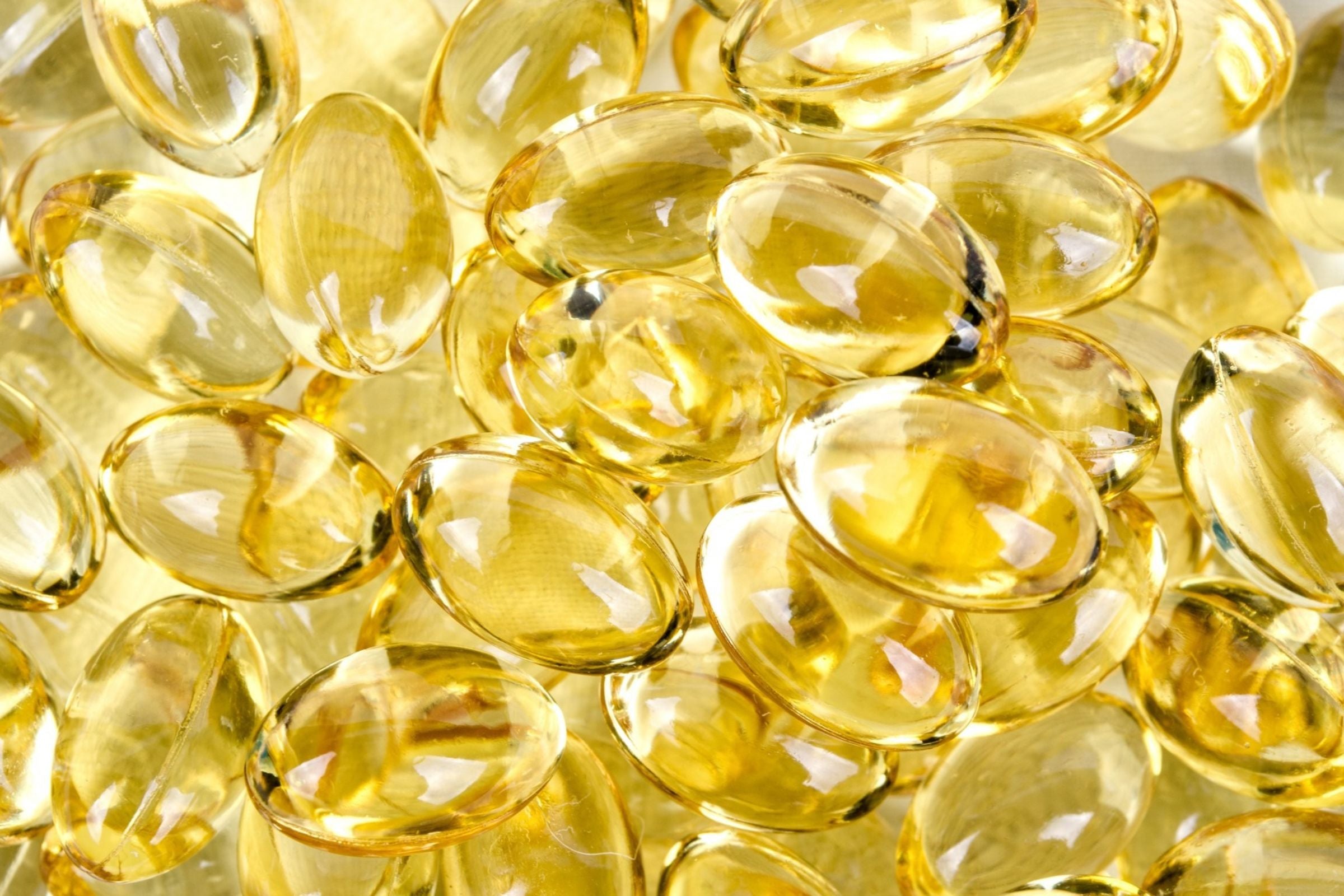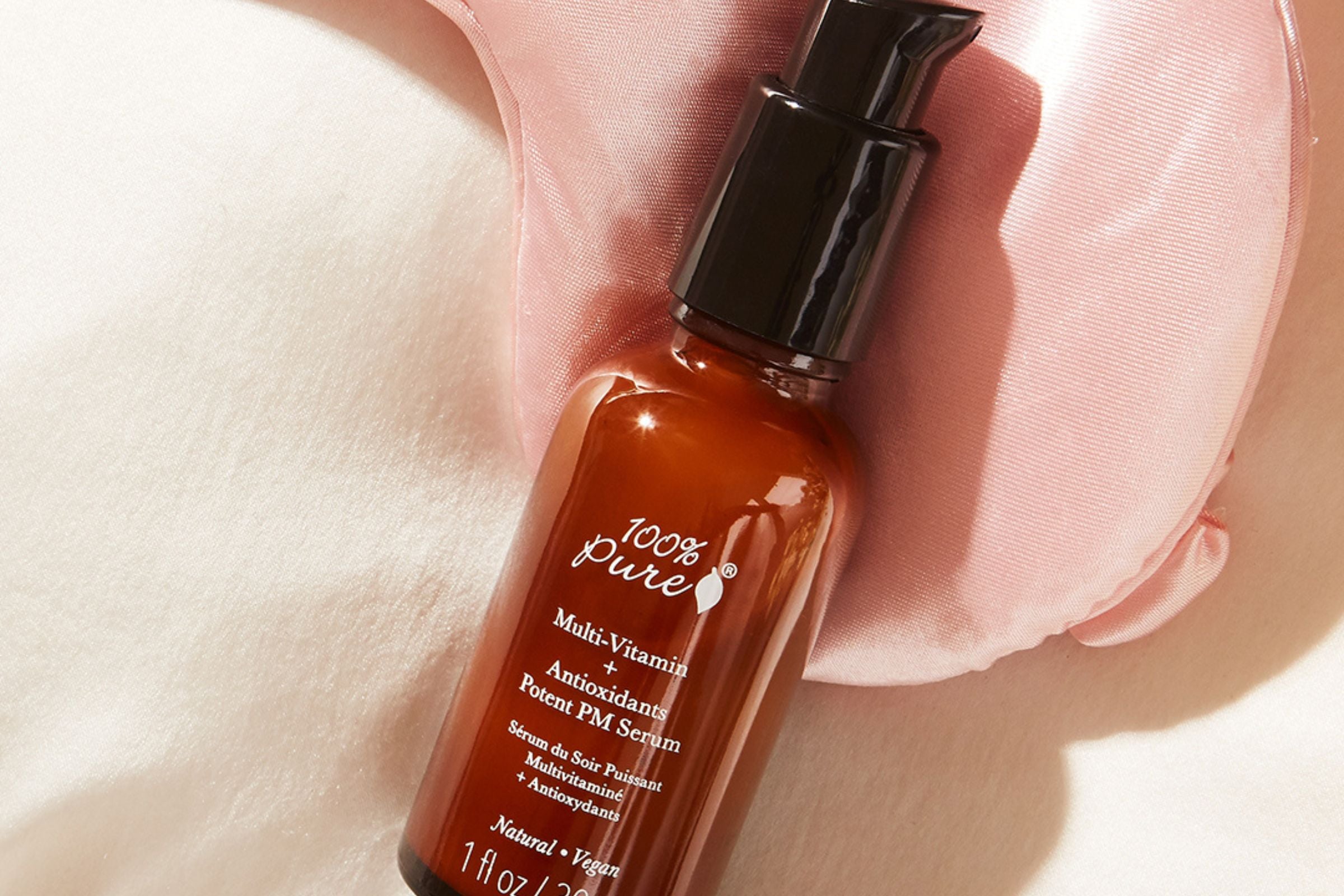Unleashing the Power of an Ancient Superfood for Skin Health
Written by: 100% PURE®
Vitamin E has long been heralded as a cornerstone ingredient in the realm of skincare, celebrated for its profound antioxidant properties and myriad benefits to the skin. This fat-soluble vitamin, naturally occurring in several foods and available as a dietary supplement, plays a critical role in protecting the skin from environmental aggressors like pollution and UV radiation. Its potency in neutralizing free radicals—molecules that can harm cells and contribute to premature aging—makes it a valuable ally in the quest for healthy, resilient skin.
Whether incorporated into over-the-counter beauty products or whipped up in a home kitchen, Vitamin E's reputation as a skincare powerhouse is well-deserved. Its ability to fight oxidative stress, coupled with its moisturizing and reparative properties, makes it an indispensable component of any skin health regimen. As we delve deeper into the benefits and applications of Vitamin E for the skin, it's clear why this nutrient has garnered such acclaim in the beauty and wellness communities.
Vitamin E is a fat-soluble antioxidant that plays a crucial role in protecting the skin from the damaging effects of free radicals. These free radicals can come from various external sources, including pollution, UV radiation, and unhealthy diets, leading to premature skin aging and damage. Vitamin E is not a single compound but a group of molecules with similar structures; the most active form in humans is alpha-tocopherol.
This nutrient is essential for maintaining the skin's protective barrier, which helps to retain moisture and keep out harmful substances. It is naturally found in the skin but can be depleted when the skin is exposed to harsh environmental conditions. Fortunately, Vitamin E can be replenished through diet or skincare products. Foods rich in Vitamin E include nuts, seeds, spinach, and broccoli, while many topical skincare products contain Vitamin E as a key ingredient due to its beneficial properties for the skin.
Benefits of Vitamin E for Skin
Vitamin E offers several key benefits for the skin, making it a popular ingredient in skincare formulations. Here are some of the most notable benefits:
- Protection Against Environmental Damage: Vitamin E's antioxidant properties help protect the skin from damage caused by free radicals and environmental aggressors like pollution and UV rays. This protective action helps prevent premature skin aging, including wrinkles and fine lines.
- Moisturizing: Vitamin E is known for its moisturizing benefits. It helps to strengthen the skin's barrier function, enabling the skin to retain more moisture. This leads to hydrated, softer, and more supple skin.
- Reducing the Appearance of Scars: While research is mixed, some studies suggest that Vitamin E may help to reduce the appearance of scars. It's believed that its antioxidant properties can help to repair damaged skin tissue, although more research is needed to fully understand its effectiveness in scar treatment.
- Anti-Inflammatory Properties: Vitamin E has been shown to have anti-inflammatory effects on the skin, which can help to soothe and calm irritated skin. This makes it beneficial for conditions like eczema or psoriasis, as well as for reducing redness and irritation from sunburn.
- Improving Skin Texture and Tone: Regular use of Vitamin E can help to improve the overall texture and tone of the skin. Its antioxidant and moisturizing properties can help smooth rough patches and even out skin tone, leading to a more radiant and healthy-looking complexion.
Incorporating Vitamin E into your skincare routine can be a simple yet effective way to enhance your skin's health and appearance. Whether through dietary sources or topical skincare products, Vitamin E offers a range of benefits that can help protect, repair, and nourish the skin, making it a valuable component of any skincare regimen.

Vitamin E is a powerhouse antioxidant that can significantly benefit your skin by hydrating, healing, and protecting it from environmental damage. Incorporating Vitamin E into your skincare routine can be done through various topical applications, including serums, creams, oils, and even DIY treatments. Let's explore the different ways you can use Vitamin E for your skin.
Topical Applications
Topical Vitamin E products are readily available in several forms, allowing you to choose the one that best fits your skin type and concerns.
Serums: Serums like the Multi-Vitamin + Antioxidants Potent PM Serum are formulated with a blend of stabilized vitamins that work together to reduce the appearance of fine lines and wrinkles, increase firmness and elasticity, and brighten and even skin tone. This particular serum combines Niacinamide and Vitamin C in a stable form, making it perfect for evening use to restore a youthful, glowing complexion.
Creams: Eye treatments such as the Multi-Vitamin + Antioxidants PM Eye Treatment are designed to target specific areas like the delicate skin around your eyes. This richly moisturizing, highly anti-aging eye cream concentrates multiple vitamins and antioxidants to lessen the appearance of lines and wrinkles, stimulate cellular regeneration, and promote collagen and elastin production for firmer, more youthful skin around the eye area.
Oils: Facial oils, including the Multi-Vitamin + Antioxidants PM Facial Oil, are age corrective treatments that visibly reduce lines and wrinkles while increasing firmness and elasticity. These oils combine the highest quality plant oils with concentrated multi-vitamins and potent antioxidants, making them an anti-aging powerhouse for nightly use.
Natural Oils: Pure oils like Argan Oil and Organic Marula Oil offer natural sources of Vitamin E, along with other beneficial nutrients. Argan oil deeply moisturizes, nourishes, and softens the skin and hair, while marula oil provides light, luxurious moisture and rejuvenates the skin for a supple glow.
DIY Treatments with Vitamin E
For those who prefer a more hands-on approach or are looking for cost-effective methods, DIY treatments incorporating Vitamin E can be a great option. Here are simple recipes for various skin concerns:
Hydrating Mask: Mix 1 tablespoon of almond oil (rich in Vitamin E) with 1 teaspoon of honey and a half mashed avocado for a deeply hydrating face mask. Apply to clean skin, leave on for 15-20 minutes, then rinse off with warm water.
Scarring and Dark Spots Treatment: Combine the contents of a Vitamin E capsule with a few drops of lemon juice and apply directly to scars or dark spots. Leave it on overnight and wash off in the morning. Always use SPF in the daytime, as lemon juice can make your skin photosensitive.
Anti-Aging Night Cream: Blend together a quarter cup of coconut oil, an eighth cup of cocoa butter, the contents of two Vitamin E capsules, and a few drops of rosehip oil for a potent anti-aging night cream. Store in a cool, dark place and apply nightly after cleansing.
Incorporating Vitamin E into your skincare routine through these various topical applications and DIY treatments can significantly enhance your skin's health, appearance, and resilience against aging and environmental damage. Always remember to patch test new products or ingredients on a small area of your skin to ensure compatibility and avoid allergic reactions.
Newsletter Subscribe
for more blog updates and exclusive discounts

Vitamin E, known for its antioxidant properties, plays a significant role in protecting the skin from environmental stressors like pollution and UV radiation. Incorporating Vitamin E into your skincare routine can help in reducing the visibility of scars, moisturizing the skin, and preventing signs of aging. To maximize its benefits, understanding how to effectively combine it with other ingredients and the best practices for application is crucial.
Effective Combination with Other Ingredients
Combining Vitamin E with specific skincare ingredients can enhance its efficacy and provide compounded benefits for the skin:
Vitamin C: When used in conjunction with Vitamin E, Vitamin C works synergistically to enhance the antioxidant effects, providing better protection against photoaging and hyperpigmentation. This combination is powerful for achieving brighter, more radiant skin.
Ferulic Acid: Ferulic acid is another antioxidant that, when paired with Vitamin E (and Vitamin C), stabilizes the blend and doubles the protective benefits against sun damage and free radicals, leading to a reduction in signs of aging.
Hyaluronic Acid: For those looking to amplify the moisturizing benefits, combining Vitamin E with hyaluronic acid can provide deep hydration, as hyaluronic acid draws moisture into the skin while Vitamin E helps to lock it in.
Retinol: Using Vitamin E with retinol (Vitamin A) can help mitigate some of the common side effects associated with retinol use, such as dryness and irritation, by providing a moisturizing buffer and enhancing skin repair and renewal.
It's important to note that while these combinations can be highly effective, the concentration and formulation of the products should be considered to avoid skin irritation, especially for sensitive skin types.
Best Practices for Application
To reap the maximum benefits of Vitamin E in skincare, follow these best practices for application:
Patch Test: Always perform a patch test before introducing a new Vitamin E product into your skincare routine, particularly if you have sensitive skin or are combining it with other active ingredients.
Apply to Damp Skin: For enhanced absorption, apply Vitamin E oil or serum to slightly damp skin. This can help lock in moisture and increase the hydrating effects.
Layer Correctly: If you're using Vitamin E in a multi-step skincare routine, apply it in the correct order. Water-based products should go on the skin first, followed by thicker serums and oils. Vitamin E oils or serums should be applied before heavier creams or moisturizers to ensure proper absorption.
Use at Night: Vitamin E is best applied in the evening, as part of your nighttime skincare routine. This allows the skin to heal and rejuvenate overnight. If you use it during the day, ensure to follow up with a broad-spectrum sunscreen to protect against UV damage.
Consistency is Key: Like with any skincare ingredient, consistent use of Vitamin E is essential for seeing results. Incorporate it into your daily routine, but also be patient, as it can take several weeks to notice significant changes in skin appearance.
By thoughtfully combining Vitamin E with compatible ingredients and adhering to best practices for application, you can significantly enhance its benefits, leading to healthier, more resilient, and radiant skin.
When it comes to incorporating Vitamin E into your skincare regimen, it's essential to approach with mindfulness and informed practices. Vitamin E, known for its antioxidant properties and skin benefits, including moisturizing and healing, can be a valuable addition to your skincare routine. However, as with any skincare ingredient, there are precautions and best practices to consider ensuring its benefits are maximized while minimizing any potential adverse effects.
Skin Sensitivity and Allergy Concerns
Vitamin E is generally considered safe for topical use, but like any compound applied to the skin, it can cause reactions in some individuals. The most common concerns include skin sensitivity and allergic reactions, which may manifest as itching, redness, swelling, or a rash. These reactions are particularly concerning for individuals with sensitive skin or those prone to allergies.
To mitigate these risks, performing a patch test before fully incorporating Vitamin E into your skincare routine is crucial. Apply a small amount of the Vitamin E product to a discreet area of your skin, such as the inside of your elbow or behind your ear, and wait 24 to 48 hours. If no adverse reaction occurs, it's likely safe to use on a broader scale. However, if you experience any irritation or discomfort, it's best to discontinue use and consult with a dermatologist.
Stability and Storage of Vitamin E
The efficacy of Vitamin E in skincare is also influenced by how the products are stored. Vitamin E can be prone to degradation when exposed to light and air, which can diminish its antioxidant properties and overall effectiveness. To preserve the integrity of your Vitamin E products, it's important to follow a few storage guidelines:
Keep in a Cool, Dark Place: Store Vitamin E products away from direct sunlight and in a cool, dark area to prevent degradation from heat and light exposure.
Tightly Seal Containers: Ensure that containers or bottles are tightly sealed after each use to limit the exposure to air, which can also accelerate the degradation process.
Use Within Expiry Dates: Pay attention to the expiration dates on your Vitamin E products. Over time, the potency can decrease, so using products within their intended shelf life ensures you're receiving the maximum benefits.
By adhering to these precautions and best practices, you can safely incorporate Vitamin E into your skincare routine, taking advantage of its numerous benefits while minimizing the risk of adverse reactions. Remember, when in doubt, consulting with a skincare professional or dermatologist can provide personalized advice tailored to your skin's needs.
Can Vitamin E Help with Acne and Acne Scarring?
Yes, Vitamin E can be beneficial for those dealing with acne and acne scarring. Its anti-inflammatory properties can help to reduce redness and inflammation associated with acne breakouts. When it comes to acne scars, Vitamin E's ability to promote skin healing and regeneration can aid in the lightening of scar tissue over time. However, it's important to note that results can vary from person to person, and Vitamin E should be used as part of a broader skincare and treatment regimen for best results.
How Often Should I Use Vitamin E Products on My Skin?
The frequency of Vitamin E application depends on the product formulation and your skin type. For most people, using Vitamin E-infused products once or twice a day is sufficient. It's typically recommended to start with a lower frequency to see how your skin reacts and then adjust accordingly. If you're using a pure Vitamin E oil, it might be more suitable for nightly use due to its thick consistency. Always follow the usage instructions on specific products for optimal results.
Is Vitamin E Suitable for All Skin Types?
Vitamin E is generally suitable for all skin types, but those with oily or acne-prone skin should proceed with caution. Since Vitamin E is oil-soluble, some formulations, especially oils and heavy creams, can be too rich for oily skin types and may contribute to clogged pores or breakouts. It's recommended to opt for lightweight, non-comedogenic formulations if you have oily or acne-prone skin. As with any skincare ingredient, doing a patch test before full application is advisable to ensure compatibility with your skin.
Can I Use Vitamin E in Both My Morning and Nighttime Routines?
Yes, Vitamin E can be incorporated into both morning and nighttime skincare routines. In the morning, it can provide an antioxidant boost to protect the skin against environmental damage throughout the day. When used at night, Vitamin E works with the body's natural healing processes to repair and regenerate the skin. If you're applying Vitamin E in the morning, ensure to follow up with a broad-spectrum sunscreen to protect your skin from UV radiation.
Are Oral Vitamin E Supplements Effective for Skin Health?
Oral Vitamin E supplements can contribute to overall skin health from the inside out, thanks to Vitamin E's antioxidant properties. However, it's important to approach supplementation with caution and consult with a healthcare provider before starting. High doses of Vitamin E can pose health risks, especially for individuals with certain medical conditions or those taking specific medications. Generally, a balanced diet rich in Vitamin E through natural sources like nuts, seeds, and leafy greens is a safer approach to improving skin health.
As we have explored throughout this article, Vitamin E stands out as a formidable ally in the pursuit of radiant, healthy skin. Its multifaceted benefits encompass moisturizing dry areas, combating the effects of free radicals, reducing the visibility of scars and fine lines, and providing a shield against environmental damage. This potent antioxidant plays a crucial role in supporting the skin's barrier function, enhancing its hydration and elasticity, which are vital for maintaining the skin's overall health and appearance.
Beyond its immediate benefits, Vitamin E's role in a holistic skincare regimen cannot be overstated. It complements other skincare ingredients, working synergistically to amplify their effects and provide a comprehensive approach to skin health. Whether it's through direct application in the form of oils and serums, or indirectly via a diet rich in Vitamin E, its inclusion in your skincare routine can lead to noticeable improvements over time.
However, it's important to remember that skincare is deeply personal, and what works for one person may not work for another. The key is to understand your skin's specific needs and how Vitamin E can meet them. Whether you're looking to address dryness, sensitivity, signs of aging, or protect against environmental stressors, Vitamin E can be tailored to fit into your regimen effectively.
We encourage our readers to consider the versatile benefits of Vitamin E and how it can enhance their skincare practices. As with any addition to your skincare routine, it's wise to start slowly and pay attention to how your skin responds. Consulting with a dermatologist can also provide personalized advice and ensure that Vitamin E is a beneficial complement to your skin health strategy.
Incorporating Vitamin E into your skincare routine is more than just a step towards achieving aesthetic goals; it's an investment in the long-term health and resilience of your skin. So, embrace the nourishing power of Vitamin E and let it guide you to a future of glowing, vibrant skin.
- Tags: February-2024, Skin Care, skincare
We carefully hand-select products based on strict purity standards, and only recommend products we feel meet this criteria. 100% PURE™ may earn a small commission for products purchased through affiliate links.
The information in this article is for educational use, and not intended to substitute professional medical advice, diagnosis, or treatment and should not be used as such.










